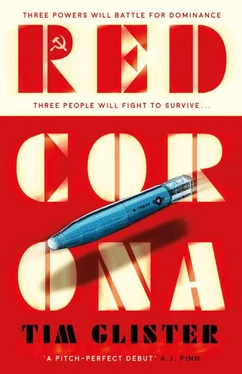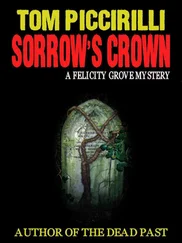He waited for Kaspar to review them, to tell him that they were indeed important, connected to Russia, and, ideally, had Manning’s coded initials somewhere in them. But, after skimming over the first couple of sheets, Kaspar’s face darkened.
‘So,’ he said to himself, ‘I have become a joke.’ Then he turned, forced the bundle back into Knox’s hands, and started to walk away.
Knox, confused, followed him. ‘What’s that supposed to mean?’
Kaspar spun on his stick to face him, suddenly boiling with anger.
‘Who put you up to this? Those bloody first-years? Who told you where I was?’ He spat the questions at Knox.
‘Your assistant told me you were here.’
‘My assistant?’
‘This isn’t a joke,’ Knox insisted. ‘This is a matter of national security.’
But Kaspar wasn’t listening. ‘I won’t be your stupid summer prank. I know what they say about me and I won’t put up with this nonsense.’
‘What nonsense?’
‘These childish scribblings,’ Kaspar said, reaching out and crumpling the papers Knox still held to his chest. ‘Pathetic.’
‘They don’t mean anything?’
‘You know damned well they don’t. Now leave me alone.’ Kaspar turned his back to Knox, spinning again on his stick. But he didn’t walk away. His anger had tired him out.
After several long breaths he spoke again, his voice quieter, more defeated.
‘I never was a Nazi. Work or die. For what? I had no choice.’ He looked up at the sky, then down at the ground. ‘But no one accepts the grey of life any more. It’s all so black and white now. So much easier to decide who the heroes and villains are.’
After a few more breaths he started walking across the Green, back towards his little office up in the rafters. Knox let him go.
If Knox had been paying attention when he caught the next train back to London he might have noticed the woman with short dark hair lingering on the Cambridge station platform. But he didn’t. He climbed straight up into the first-class carriage, chose an empty compartment, sat in the middle seat – a sign to anyone looking for a seat to keep moving – and settled into his thoughts about his encounter with Kaspar for the whole journey.
Knox also didn’t notice the same woman following twenty feet behind him as he walked along the platform at King’s Cross and down into the Underground. He was still lost in thought when he boarded a Piccadilly Line train and accidentally ended up in a smoking carriage. He rode the single stop north to Caledonian Road in a thick miasma of old, hot smoke.
The woman also took the tube one stop, and trailed Knox along Hillmarton Road. Then, as soon as she was sure where he was headed, she doubled back on herself, shaking her head as if she’d just realised she’d left something important at home, and went back down into the Underground.
The ornate turrets of HMP Holloway looked more like they belonged to a Cambridge college than the front of a prison in north London. The imposing architecture of Holloway prison, which was originally opened in 1852, was intended to inspire respect for the law. The castle-like facade was also apt as conditions inside for most of the prison’s residents were positively medieval.
Once criminal charges had been brought against the four members of the Calder Hall Ring and the case became public, Sandra Horne had been transferred from the secure holding cell on the third floor of Leconfield House to Holloway. Knox didn’t agree with the decision.
‘We can’t guarantee her safety if she isn’t in our custody,’ he argued. ‘And Holloway is hardly the leniency we promised for cooperation.’
But he’d been overruled.
‘It’s not our decision to make any more,’ Holland said. ‘But I’ve been assured she’ll be held in solitary confinement, away from any inmate who might wish to do her harm.’
It was a peculiar character trait of many prisoners that they developed a fierce patriotism for the country that had locked them up. To many of Holloway’s long-term residents, Sandra Horne’s role in passing on classified information to the KGB was as treasonous as trying to kill a member of the royal family.
Knox stepped through the stone arch entrance to the prison and into the guard’s office. The man on duty recognised him from his previous visits to Horne and, luckily for Knox, waved him through without checking if his presence had been approved.
Five minutes later, he was sitting in a spartan meeting room, waiting for Horne to be brought to him. The room was cold. Its concrete and brick floor and walls were whitewashed, its heavy door was painted gunmetal grey. There were no windows. Knox sat on one of two chairs that faced each other across a small Formica table.
Knox knew Horne might not know anything about Bianchi and Moretti, but he still had questions about the mysterious contact in Cecil Court she’d alluded to when she’d first been persuaded to talk. Knox wanted to know if there was another Soviet agent operating in the city.
The bolt on the door shifted and Sandra Horne was brought into the room by a silent female guard. Horne looked like she’d aged ten years since Knox had last seen her. She was wearing the drab grey shirt and skirt all female inmates at Holloway wore. Her hair, which she’d managed to keep in high, gravity-defying curls throughout her stay at Leconfield House, now hung flat and limp in a straggly bob.
The guard pointed at the chair opposite Knox, waited for Horne to sit down, gave Knox a curt nod, and retreated from the room, locking the bolt across the door behind her.
It seemed to take a Horne a moment to recognise Knox, and when she did, she let out a long, irritated sigh.
‘When are you people going to leave me in peace?’ she asked, her voice thin and tired.
It didn’t fool Knox. He knew how shrewd an operator the woman sitting across from him was. ‘Drop the act, Sandra,’ he replied.
Her face broke into a broad, bright smile. ‘Oh, dearie, let me have my fun.’ Her voice was suddenly alive and devious. ‘I am popular, aren’t I? You lot should move in. Save you making the trip over from Mayfair every day.’
Knox didn’t like the idea of someone else handling Horne now. The Calder Hall case had been his operation, his victory, and he should have been able to see it through. But that wasn’t an option right now. At least it looked like news of his suspension hadn’t reached Horne yet.
‘You know the deal,’ he said. ‘Unless you’d rather we put you on a plane and let you take your chances in Russia.’
Knox and Horne both knew what happened to most blown KGB assets when they went to Moscow looking for sanctuary. The lucky ones never made it out of Sheremetyevo airport.
‘I’d have to talk to my husband about that,’ Horne said, her grin turning cold. It was a thinly veiled barb. Sandra was the brains behind Calder Hall, and she blamed Peter for cracking and landing them both in prison. He’d been sent to Pentonville when she had come to Holloway and, as far as Knox knew, she’d made no requests to have them reunited.
‘So,’ she continued, ‘what do you want to know today? Where Montcalm drank all his money away? Or if Slaughter really is that stupid?’
It had become clear over the course of interrogating the ring’s members that not only was Sandra in charge but that she’d also seemed to know where her collaborators were and what they were doing without ever leaving her house in Richmond. Montcalm had indeed spent most of the cash he received from the KGB via the Hornes drinking and gambling his way up and down the country, creating a vicious circle of debt and addiction that always led him back to London and Calder Hall. As for Slaughter, he’d maintained throughout his questioning that he had no idea he was working for the Russians. In fact, the security guard claimed he’d been slipping secrets to the Campaign for Nuclear Disarmament in exchange for money to supplement his meagre income.
Читать дальше












